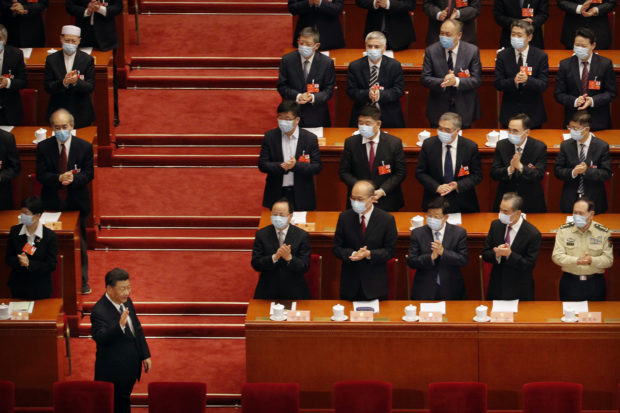
Chinese President Xi Jinping, left, gestures as he arrives for the opening session of the Chinese People’s Political Consultative Conference (CPPCC) at the Great Hall of the People in Beijing, Thursday, May 21, 2020. (AP Photo/Andy Wong, Pool)
BEIJING — China began its most important political event of the year on Thursday after a two-month delay because of the coronavirus pandemic.
The opening of the annual session of the Chinese People’s Political Consultative Conference is a further sign of what the government said is its victory over the outbreak that originated in the central city of Wuhan late last year.
That will be followed Friday by the opening of the National People’s Congress, the ceremonial parliament, highlighted by a speech from Premier Li Keqiang outlining economic and social goals for the year.
It remains unclear whether Li will issue the usual gross domestic product growth target for the world’s second-largest economy. Given the economic devastation caused by the pandemic, the target GDP will likely be considerably lower than last year’s 6.0% to 6.5%.
Tens of millions of Chinese have been thrown out of work and it’s unclear how many jobs will return after the crisis passes. Not only have domestic production and demand been hammered, but China’s key export markets such as the United States and Europe have also suffered massive job losses and drops in consumption.
This year’s meeting of the two bodies is being shortened to one week from the usual two as part of virus-control measures. Media access has also been largely reduced and only a limited number of reporters, diplomats, and observers were permitted into the vast auditorium inside the Great Hall of the People in the heart of Beijing. The more than 2,000 delegates in attendance wore masks.
Backed by massive state propaganda support, president and Communist Party leader Xi Jinping has received plaudits at home for having contained the virus, even while the U.S. and others question China’s handling of the initial outbreak.
The Chinese public is also largely seen as backing Xi in his confrontational approach to foreign policy challenges, including criticisms from the U.S., Australia, and others.
Abroad, however, that policy has further bolstered concerns about China’s intentions, and the Trump administration has increasingly pressed China over trade, technology, and other issues. That may ultimately add to Xi’s difficulties in reviving economic growth and jobs at a time when global markets are partly shut and skepticism toward China runs high.